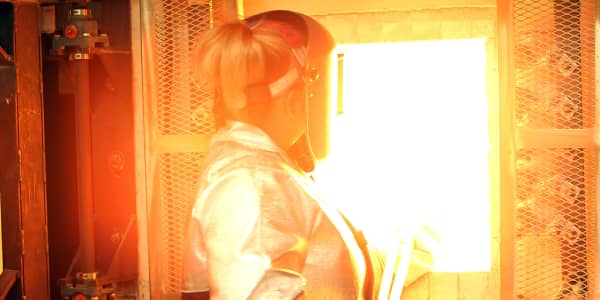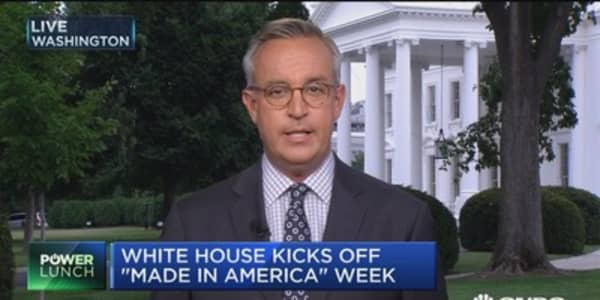Making it in the U.S.A.—a tough proposition in recent years—has gotten a little easier for some young firms, thanks to the spread of crowdfunding.
Many fledgling makers are jumping onto the sites to raise money to make everything from clothing to tech gadgets manufactured in the U.S.
Jake Bronstein is one of them. His six-employee Brooklyn, New York, company, Flint and Tinder, has, since 2013, run four successful crowdfunding campaigns on Kickstarter for products that are made in the U.S. He used the site to take preorders for premium men's underwear; a hoodie sweatshirt, where he raised $1 million; a set of blue shoelaces to show support for American manufacturing; and custom jeans.
Flint and Tinder is profitable and on track to bring in $10 million in revenue this year, he said.
The allure of the crowd
One draw of crowdfunding sites such as Kickstarter and Indiegogo for makers like him is that they let entrepreneurs take preorders. Customers pay in advance for a product that is not yet made, giving fundraisers the money they need ahead of time to buy materials and pay labor costs.
Read MoreGoogle is about to change the world
"You get to sell it first," said Bronstein. "It brings the money to manufacture the product, as opposed to spending the money and hoping you can sell the product."
One of the advantages [of crowdfunding] is you get to test what the demand is and ask people exactly what they want before you make it.Jake BronsteinFlint and Tinder
Bronstein isn't alone among U.S manufacturers turning to crowdfunding sites. On Kickstarter, perhaps the best-known crowdfunding site, the top five most-funded projects are manufactured products. No. 1 was the Pebble Time smartwatch, which raised $20.3 million; in second place was the Coolest Cooler, a picnic cooler with an outdoor Bluetooth speaker, which raised $13.2 million.
The sites can be a good place for start-ups like his to raise money. In 2014, 41.3 percent of crowdfunding volume around the world went to businesses and entrepreneurs, according to recently released data from the research and advisory firm Massolution in Los Angeles. That adds up to a global pot of $6.7 billion.
One of the biggest challenges facing manufacturers who rely on plants in the U.S. is keeping overhead low, given that it is easy for their rivals to make similar products in China or other countries with lower labor costs for less.
Bronstein has found that crowdfunding helps bring efficiencies to his company, which contracts out work to U.S.-based plants.
Read MoreWhat does it cost to open a fast-food franchise?
"You're not making products people don't want," says Bronstein. "One of the advantages is you get to test what the demand is and ask people exactly what they want before you make it."
He has been so happy with crowdfunding that he has set up his company website to run its own campaigns without involving an outside crowdfunding site, like Kickstarter "We turn on and off the projects very easily," he says. "If we don't get enough orders, we don't make it. We return everybody's money."
Flexible finance option
Of course, many manufacturers still turn to traditional types of financing, such as finding investors. And others finance their efforts through cash flow.
That's the case for Craig Wolfe, CEO of CelebriDucks, a 20-employee firm that makes custom rubber ducks from a factory in the Bronx. "I fund it all myself," said Wolfe, who has been in business since 1997 and started out publishing artwork from TV commercials. He believes he is the only U.S.-based maker of rubber ducks. His customized versions range from DevoDuck ("Quack that whip!") to a sushi-themed duck made for Kikkoman, the food and drink maker from Japan.
Wolfe likes funding his company himself because he has more control than he would with outside investors. "I own the company," he said. "If I didn't own the company, they would say, 'You are not maximizing shareholder value.'" While he declines to share the company's revenues, he said it has sold millions of rubber ducks and filled custom orders for clients ranging from Harley-Davidson to United Way.
Still, many entrepreneurs can't afford to self-finance made-in-the-U.S.A. products. And that is keeping crowdfunding sites busy.
Eugene Stark launched an Indiegogo campaign on June 1 for Hoovy, an advertising platform he founded that uses drones to fly advertising banners. He is promoting the campaign to the couple of hundred subscribers on the startup's mailing list, via social media and through a press release. His goal for the 30-day campaign on the crowdfunding site Indiegogo to raise $50,000. As of June 3, he had raised $11,883 from 44 people.
Read More1 kid's sport breeds success
"This whole strategy is new," Stark says. "We have no idea how it's going to turn out." In the campaign he is taking pre-orders for the Advatar Octocopter, which normally goes for $15,000, offering it for $8,999. Currently his 12-person team makes the drones using 3-D printers from its office in Los Angeles. If he hits his funding goal, he says he'll face a new challenge: shipping them in two months. "We'll definitely have to hire more people," said Stark.
—By Elaine Pofeldt, special to CNBC.com




